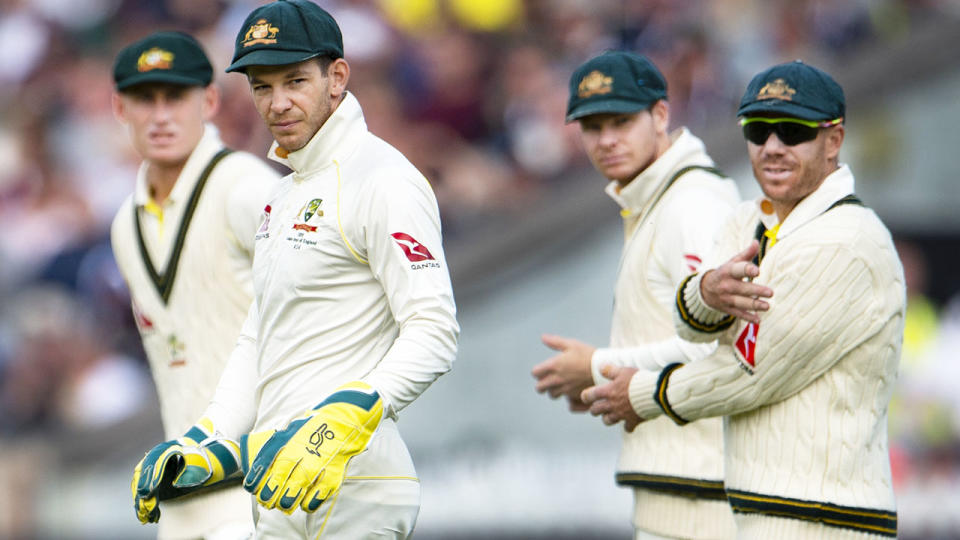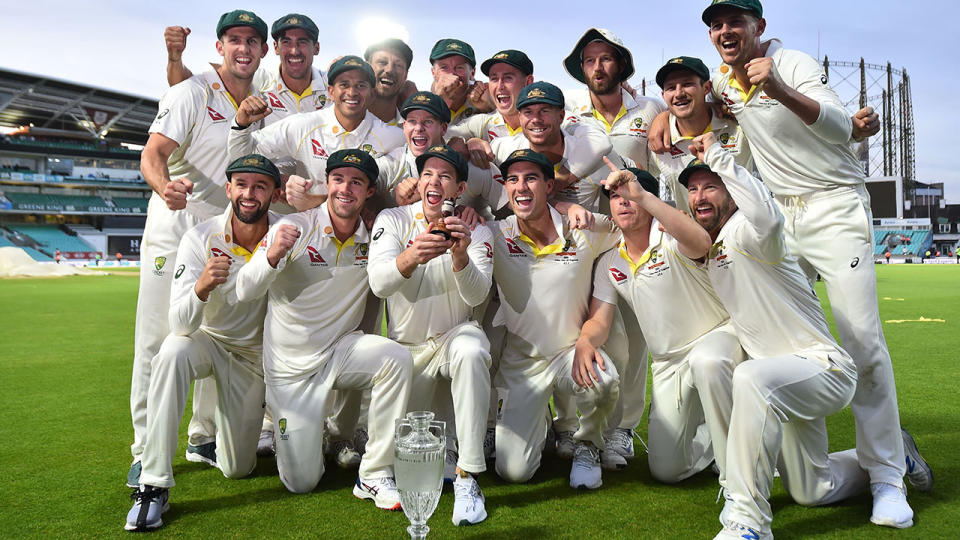How the Ashes highlighted Australia's ball-tampering shame
Tim Paine’s Ashes performance was officially the worst from an Australian wicketkeeper in 26 years.
The Australian captain managed just 180 runs with the bat across the five-Test series - an average of 20.
It makes for the lowest batting average from an Australian wicketkeeper in a five-Test series since 1993.
Tim Paine's average of 20.00 this series is the lowest for an Australian wicketkeeper in a five-Test series since 1993. #Ashes
— The CricViz Analyst (@cricvizanalyst) September 15, 2019
But the ramifications from Australia’s ball-tampering scandal mean Paine is Australia’s captain and wicketkeeper out of sheer necessity.
Steve Smith is in the midst of a one-year ban from all leadership positions, while previous vice-captain David Warner is banned from such positions for life.
WHAT CONTROVERSY: Steve Smith photo smashes Jack Leach scandal
Paine became the captain almost by default because of a lack of leadership and experience in the side when Smith and Warner were suspended.
Paine’s performances with the bat (and to a lesser extent the gloves) haven’t exactly been enough to see him retain his spot, but what other options do the Aussies have?

You can’t pick a side without considering who will be the captain.
If the sandpaper scandal never happened, Smith would still be captain and Alex Carey would most likely be the wicketkeeper.
But Paine will stay because of a lack of any real captaincy replacements.
Travis Head - vice-captain for the first four Ashes Tests - was dropped to make way for Mitchell Marsh in the fifth Test.
Marsh himself was vice-captain at one stage before he was dropped.
Usman Khawaja captains Queensland in Sheffield Shield cricket, but hasn’t been able to cement his spot in Australia’s XI.
Pat Cummins, Josh Hazlewood and Nathan Lyon would all seemingly be viable candidates, but selectors appear unwilling to hand the captaincy to a bowler.

Paine’s captaincy called into question
Paine’s leadership throughout one of the darkest periods in Australian cricket history has been undeniably good.
But has his captaincy been that great?
His struggles with the DRS reached historic lows, successfully reviewing just one out of 13 attempts throughout the Ashes.
His decision to bowl first in the fifth Test at The Oval - one of England’s best batting decks - was also widely criticised.
Paine's team return to Australia after successfully retaining the Ashes, something their predecessors on tours of England in 2005, 2009, 2013 and 2015 failed to achieve.
But a loss in the series finale means the drought drags on; Australia haven't recorded an Ashes series win in England since Steve Waugh's side triumphed 4-1 in 2001.
Coach Justin Langer, who flashed an ice-cold look in the rooms as England completed a 135-run victory, expressed mixed emotions.
"A bit hollow really,” Langer said of the missed opportunity.
Paine conceded he simply wasn’t good enough with reviews and made no excuses for his continual DRS failures.
"I'm going to do some umpiring school when I get home," he said.
"I'll enrol in a level three umpires course and see if I can get them right.
"I'm getting it wrong, I don't know what else to say. We're having a mare. We've got it wrong.
"It happens, it's fast, it's a tough job. As I've said throughout the whole Test series I've got a new respect for umpiring, particularly in Test cricket.
"For years players whinged about umpiring and now we've got it in our hands a little bit and we're finding that it's hard."
There’s no questioning the outstanding job Paine has done, but the uncomfortable reality is he probably shouldn’t be there.
Tim Paine was the captain we needed, but his time is up #Ashes2019 https://t.co/6Osv86rsZx
— wally mason (@walmason) September 16, 2019
Tim Paine is a terrific fellow but that's not enough to captain and keep for Australia. Need to bring in Alex Carey and rotate the captaincy around the squad. Happy for Tim to hang around getting the boys energy drinks or running errands for the coaching staff.
— Patrick Avenelllllllllll (@Patrickavenell) September 15, 2019
I love Tim Paine. But he’s not a good enough cricketer to be in the team. Being a good bloke is not enough in sport.
— Bevan Colless (@bcolless) September 15, 2019
Tim Paine’s disastrous captaincy and inability to manage DRS cost them the Headingley match and even the Oval, if you have Lyon why would you bowl first at the Oval after winning the toss.
— Minal (@Granger_Gab) September 16, 2019
It seems like Tim Paine never wanted to win the 4th test and retain the ashes with aussies.😕
Dissappointed with his captaincy for the first time and missed opportunites,weak bowling.
Everytime Smith will not be the ultimate saviour for them.☹#Ashes— Raghav Acharya. (@Raghavacharya95) September 16, 2019
Tim Paine was the right captain for that moment, but that moment has long passed. Australia needs a captain who can contribute with either bat or ball, and at least have decent cricket intelligence. As it is, Paine has not justified his place on the team, let alone the captaincy.
— El Trump Rex (@rex_trump) September 16, 2019
with AAP
